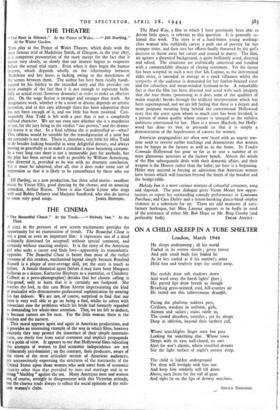THE THEATRE
- The Rest is Silence." At the Prince of Wales.—" Jill Darling." At the Winter Garden.
Tilts play at the Prince of Wales Theatre, which deals with the once famous trial of Madeleine Smith, of Glasgow, in the year 1857, is a competent presentation of the story except for the fact that it moves very slowly, so slowly that our interest begins to evaporate before the actual trial starts. Even when it does begin the human interest, which depends wholly on the relationship between Madeleine and her lover, is lacking owing to the sketchiness of the scenes between them. The author has here been fatally handi- capped by .his fidelity to the recorded story and this provides one more example of the fact that it is not enough to represent faith- fully an actual event (however dramatic) in order to make an effective play. On the stage fiction is stranger and stronger than truth. An imaginative work, whether it be a novel or drama, depends on artistic invention, and in this case although there has been adaptation there has not been enough of it, and too little has been invented. Con- sequently Ann Todd is left with a part that is not a completely realised character. We are not even sure whether she is a murderess or not, for the jury bring in the verdict " not proven," and the drama- tist leaves it at that. In a final tableau she is pedestalled as—what? This tableau would be suitable for the transfiguration of a saint but she certainly is not that. There is, therefore, very little for Miss Todd to do besides looking beautiful in some delightful dresses, and always moving so gracefully as to make a crinoline a most becoming costume. In a very long cast there is not a memorable part for anybody, but the play has been served as well as possible by William Armstrong, who directed it, provided as he was with no dramatic conclusion. Yet it must be admitted, after all, that it does make some sort of impression so that it is likely to be remembered by those who see it.
dill Darling, in a new production, has three solid merits: excellent music by Vivian Ellis, good dancing by the chorus, and an amusing comedian, Arthur Riscoe. There is also Carole Lynne who sings well and Bobby Delaney and Marjorie Sandford, who also do justice


























 Previous page
Previous page